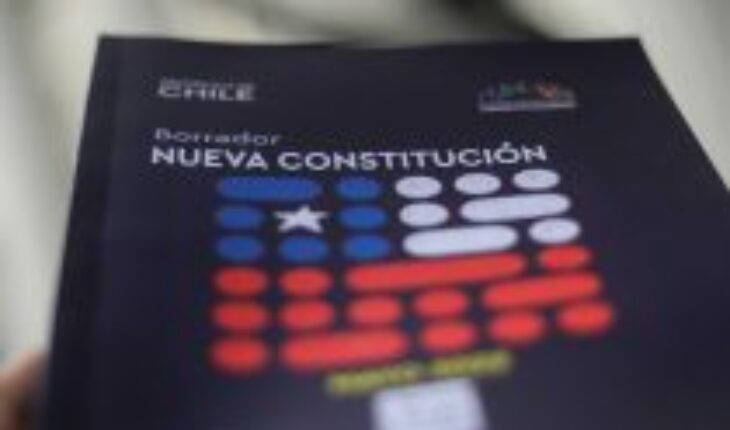The constitutional proposal has stimulated a broad national debate. In general, those who are for the Approval highlight advances such as the recognition of indigenous peoples; gender parity and acceptance of sexual dissent; the State of solidarity and social rights; the restoration of the majority principle in the formation of laws (elimination of the supramajorities to approve the laws and of the preventive control of constitutionality, mechanisms of direct democracy). For their part, those who are for the Rejection warn of serious dangers to democracy (lack of counterweights between public functions and high probability of concentration of power); for the integrity of the State (as an undesirable effect of plurinationality); for the dignity of the human person (abortion without causes or deadlines, free euthanasia, ideological conception of sexuality); for freedom (the overflowing role of the State), and for the financial stability of the State (fiscal voracity, public corruption, confiscatory taxes and stiflers of free initiative, etc.).
Do you notice any regularity in these positions?
Yes, there is. Supporters of the new Constitution highlight what it contains, what it is. The detractors, what she can become. Act and power, as Aristotle taught. For the philosopher, act means the being already realized, that is, that which a being already is at a certain moment (a seed, is seed) on the spot). The power instead, it refers to the possibility that something will transform, change. Power it means what it is not at that moment, but which it can become (a seed is a tree in potential). In other words, potency is a simple possibility that something will become something else, or that it will undergo a change.
It is enough to read the constitutional proposal to understand what it is and what it contains, in act. It contains, as has already been said in part, a radical change in the role that is recognized to the State (active, solidary, non-subsidiary role, guarantor of social rights, type of Welfare State), an immediate demand for our native peoples (for the mere fact of ceasing to make them invisible, but mainly with the recognition of their collective rights, respect for their language, traditions and normative systems, etc.), an evident improvement in the political and administrative system (true decentralization, parity, reserved seats, elimination of preventive control of constitutionality, elimination of supramajorities, substantive mechanisms of direct democracy, etc.). For the Approval, that is the new Constitution, on the spot; and in potential, is a relevant step to face and hopefully begin to solve the serious imbalances of Chilean society.
In the path of Rejection the emphasis is not on what the new Constitution is, directly, but on the dangers it entails, on what is in potential. For example, in its concept, the proposed text would allow a law to be enacted granting the right to have an abortion until the day of delivery; or one that, by regulating regional, communal and indigenous autonomies, recognizes the latter as to have such a degree of independence as to imply that there are territories forbidden to the State of Chile and Chileans, and thereby incite secession; or a law expropriating certain assets, fixing as compensation values below the market value, on the pretext that said value is not a fair price; or one that expropriates individual pension savings without compensating, weight by weight, the expropriated funds; or, finally, a law that prohibits the particular provision of health services and obliges everyone to be served by the public system. All these dangers in potential, as is evident, require the enactment of laws in the future.
Leaving aside the fact that it is indeed extremely unlikely (I do not exaggerate) that the Constitutional Court considers that laws like these pass the test of constitutionality, for these undesirable effects to occur (as Aristotle teaches) it is necessary that a movement occurs, a change: that Parliament dictates such exotic laws, an issue that has a probability close to zero (I do not exaggerate either). Counter-argument may be made that not all the grave dangers that come with the proposal require the (unlikely) enactment of laws. However, the truth is that all these dangers require, if not laws, the concurrence of facts that are totally hypothetical: that “circumstantial majorities” allow a de facto dictator to control at the same time the Executive, the Legislative and the Judicial Power; that judges lose their independence and become political (because the Justice Council is composed of “only” nine of its 17 members belonging to the judicial orbit – seven judges and two officials of the Justice System – and because appointments may be co-opted by politics); that the co-legislative powers acted with such a degree of fiscal irresponsibility (although the constitutional proposal prohibits it!) that Chile would get bogged down between an overflowing, inefficient, wasteful and corrupt state, and a depressed and, worse, oppressed private sector. (I clarify that I do not affirm that all the supporters of the Rejection agree with these omens, but I bring them up because they, however, are undoubtedly included in the range of reasons that this sector uses to reject the proposal).
Thus, and following the classic philosopher, we should recognize that there is a kind of epistemic imbalance in this debate: some, the Approve, emphasize what the new Constitution says and is; others, rejection, what that text may mean in the future, if certain events occur (laws or hypothetical behaviors). Act and power. Judge yourself.
Follow us on
The content expressed in this opinion column is the sole responsibility of its author, and does not necessarily reflect the editorial line or position of El Mostrador.





